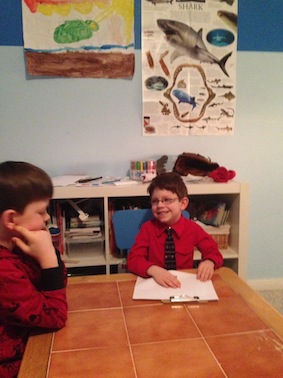“Daddy, I Want You To Come To Shark School”
Thinning The Borders Between Learning Contexts
My cell phone rang yesterday morning at about 8:00, just as I was making Sunday breakfast for the kids. My display indicated that the call was coming from an upstairs extension in my own home. Curious, I answered and was surprised to hear the voice of my five year-old on the other end of the conversation.
“Daddy, it’s your son. I want you to come to Shark School today at 12:35. Here’s what you need to bring: your backpack, something to write with and a snack!”
My cell phone rang yesterday morning at about 8:00, just as I was making Sunday breakfast for the kids. My display indicated that the call was coming from an upstairs extension in my own home. Curious, I answered and was surprised to hear the voice of my five year-old on the other end of the conversation.
“Daddy, it’s your son. I want you to come to Shark School today at 12:35. Here’s what you need to bring: your backpack, something to write with and a snack!”
Before hanging up, he reminded me of the time and warned me against being late.
I dutifully climbed the stairs at 12:35 that afternoon only to be greeted by both Luke and Liam, dressed in shirts and ties. (They never wear shirts and ties together, at the same time!) I was welcomed into their room and ushered to my place at a table that they had, somehow, successfully moved from their play room.
“Daddy, we didn’t bang any walls. Well…maybe a little!”
The room had been cleaned up to make space for their new adventure. Liam had come across a book about sharks that his older brother had given him for Christmas. He had removed the poster from the back of the book and it was now affixed to the wall behind their learning table. Also included in the space were a couple of other books about sharks and 4 specially-designed learning logs, each labelled: Mommy, Daddy, Luke and Liam

I took my place at one of the chairs and waited until I was given further instructions.
“Welcome to our Knowledge-Building Circle”, Liam began.
“Well,” interjected Luke, “It’s not really a circle Liam; it’s more of a square.”
“We’ll just pretend it’s a circle,” whispered Liam. “Daddy, we want you to write down everything you know about sharks.”
“Ok,” I said as a picked up a coloured pencil and began to write.
“So, what’s a Knowledge-Building Circle?” I asked.
“Well, it’s a big circle where everyone sits around and tells what they know about something. And then we ask questions so we can find out more,” Liam explained. “So, that’s why we told you to write everything you know about sharks.”
“What’s the point of doing that,” I asked.
“Well, we can learn more if we share what we know. We kind of learn from each other.”
After writing in my journal for a few minutes, Liam rose to point out a few fascinating things on his shark poster. Then we had a snack.
Later that evening, I found a YouTube channel dedicated to sharks and we ended our day by watching a couple rather engaging excerpts.
As Liam went to bed, he said that he was going to wear his shirt and tie to school on Monday. He was also going to bring his shark book to share his learning with the class.
Liam is blessed with teachers who recognize that powerful learning happens in many ways, across many contexts. They allow him the space to bring his non-school life into the classroom, through costumes, books, toys and games. The borders between home and school are quite thin.
The more I experience being a parent in the 21st century, the more I’m convinced that we need to work to resist the thickening of the borders that happens when children become students . School, home and life in the community are all places for important contextual learning yet there comes a point where, inevitably, one context is held up as being more important and valuable than the others. For most of us, school is that one context.
But I think that we need to imagine ways where we can guard against the thickening of contextual borders. Because once the walls go up, they are extremely difficult to tear down. We need to share what we imagine, and we need to put some of these ideas into practice.
As an example, what might happen if we were to intentionally set aside one day per week in our schools where homework didn’t mean schoolwork that you had to finish at home but, instead, was defined as an opportunity to continue at school something that was started at home? Think of the opportunities for knowledge-building circles if the impetus for learning were allowed to move in the opposite direction. I suspect that if we started with just one day per week, it wouldn’t be too long before, realizing the power of the school-home connections, both contexts would become richer and more vibrant learning contexts. Who knows? One day could become two—or more!
Perhaps this is the new flip that needs to be imagined and explored.
This is just one idea that help to keep the borders thin. You likely have some of your own. I look forward to hearing about them!
